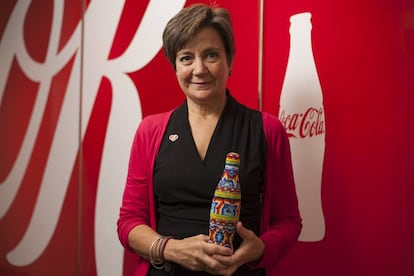“We want the community to become guardians of the forest”
Mexico Coca Cola Foundation head Vivian Alegría discusses her organization’s work to improve water distribution
Mexico has problems when it comes to the distribution of water. Although it boasts large reserves in the form of aquifers and receives abundant rainfall, a large part of the country lacks constant access to this most basic of necessities. Among the various projects carried out by the Coca-Cola Foundation Mexico are a number of programs that aim to get water to the country’s most marginalized groups.

The director of the foundation, Vivian Alegría, talks to EL PAÍS about these projects that contribute to sustainable development and involve all of Coca-Cola’s operations in Mexico.
Question. Tell us about your projects aimed at restoring ecological zones.
Answer. In Mexico we began working on a reforestation and water harvesting project with the NGO Pro Natura, the Environment Ministry (Semarnat), the National Forestry Commission (Conafor) and the National Commission of Protected Natural Areas (Conanp). We have always worked within the “golden triangle” framework, involving the government, civil organizations and the community: our objectives are the objectives of the country. We started the project nine years ago and have reforested 64,000 hectares with 73 million trees.
Q. How do you ensure that your projects are sustainable?
More than 20,000 people work on this project and we are present in more than 1,000 communities
A. We are equally involved in the environmental, social and personal aspects of communities. When you start with reforesting, the first thing you ask yourself is, “What happened here?” You realize that people live from the felling of trees, and that’s why we believe that productive projects are those in which the community becomes the guardian of the forest. We carry out our work so that people can live from natural resources and they help us to improve groundwater recharge and ensure deforestation doesn’t take place.
Q. What programs do you have to improve the distribution of water in the country?
A. Since 2014 we have returned 100% of the water we use in Mexico to make our products in accordance with measurements carried out for us by the National Autonomous University of Mexico (UNAM). More than 20,000 people work on this project and we are present in more than 1,000 communities. Pro Natura and Conafor investigate zones where recharge is necessary and where water is needed. They tell us where to work and make connections with communities on the ground.
Q. What problems have you had in the first few years of the project?
A. At first we had a lot of problems with credibility: it was very difficult. Communities didn’t believe Coca-Cola could help. We started with the goal of reforesting 25,000 hectares with 30 million trees in five years but we realized that the most that civil organizations or companies had reforested each year was 100 hectares. However, in the first year we managed to reforest 1,700 hectares and later on – following the recommendations of the communities with which we worked – it was easier. In the second year we reforested 7,000 hectares and in the third year 9,000 hectares.
Q. What projects are you running to deliver drinking water to marginalized communities?
A. We try and bring safe water to communities where there isn’t any. We install our drinking fountains in rural schools. In places where they have springs, we put filters in place. If there is infrastructure, we connect the community up to the network and install water-treatment systems.
At first we had problems with credibility: people didn’t believe Coca-Cola could help
We have installed more than 1,000 drinking fountains to date. We also set up tanks in districts where water is supplied via pipes and where people are used to filling up small containers for individual households: containers which only hold enough water for two days. In these communities tanks are installed which allowed the same water to last up to a month.
Q. How do use water in the production of your products?
A. All of our bottling plants have a water-treatment plant, which provides water for the washing of vehicles and other purposes. Some plants have rainfall-harvesting facilities and we have cut down the use of water by more than 30%.
Q. What plans does the foundation have in the short and medium term?
A. This year we are going to focus on the maintenance of 5,800 hectares of forest. We need to pause and assess the zones we have already worked on. There are areas where, because of drought or icy conditions, we have to carry out replanting. We are going to continue with production projects and installing water harvesting ponds. We want to keep returning 100% of the water we use in a sustainable fashion.
English version by George Mills.
Tu suscripción se está usando en otro dispositivo
¿Quieres añadir otro usuario a tu suscripción?
Si continúas leyendo en este dispositivo, no se podrá leer en el otro.
FlechaTu suscripción se está usando en otro dispositivo y solo puedes acceder a EL PAÍS desde un dispositivo a la vez.
Si quieres compartir tu cuenta, cambia tu suscripción a la modalidad Premium, así podrás añadir otro usuario. Cada uno accederá con su propia cuenta de email, lo que os permitirá personalizar vuestra experiencia en EL PAÍS.
¿Tienes una suscripción de empresa? Accede aquí para contratar más cuentas.
En el caso de no saber quién está usando tu cuenta, te recomendamos cambiar tu contraseña aquí.
Si decides continuar compartiendo tu cuenta, este mensaje se mostrará en tu dispositivo y en el de la otra persona que está usando tu cuenta de forma indefinida, afectando a tu experiencia de lectura. Puedes consultar aquí los términos y condiciones de la suscripción digital.








































